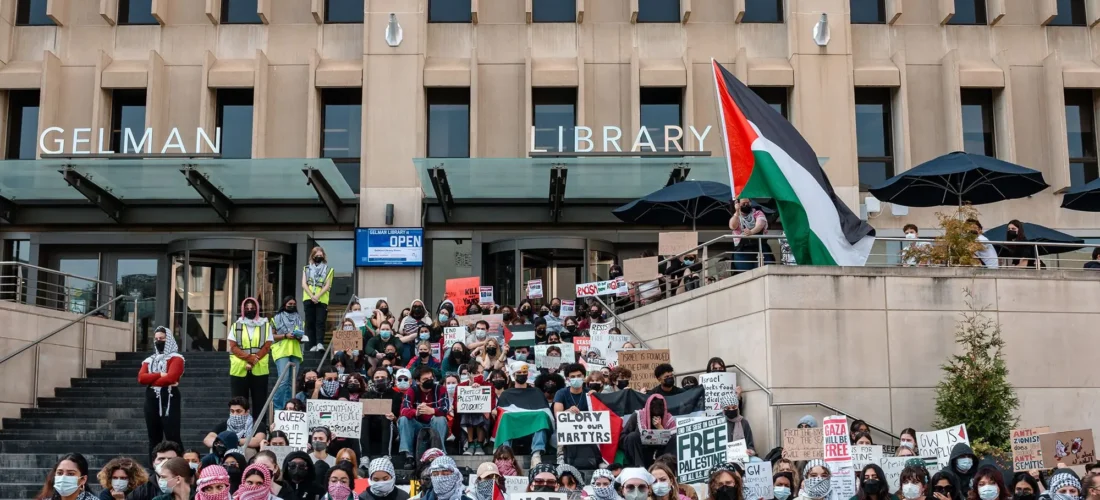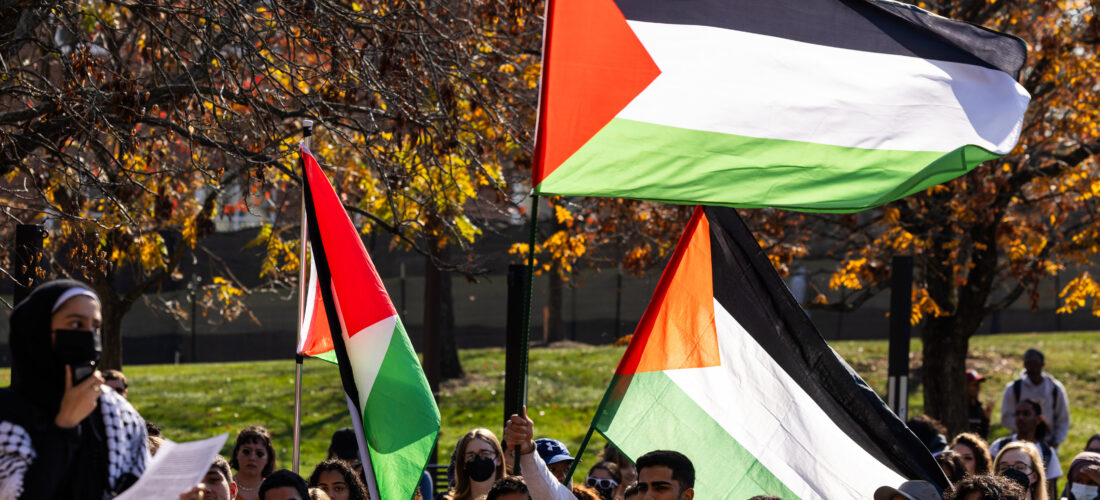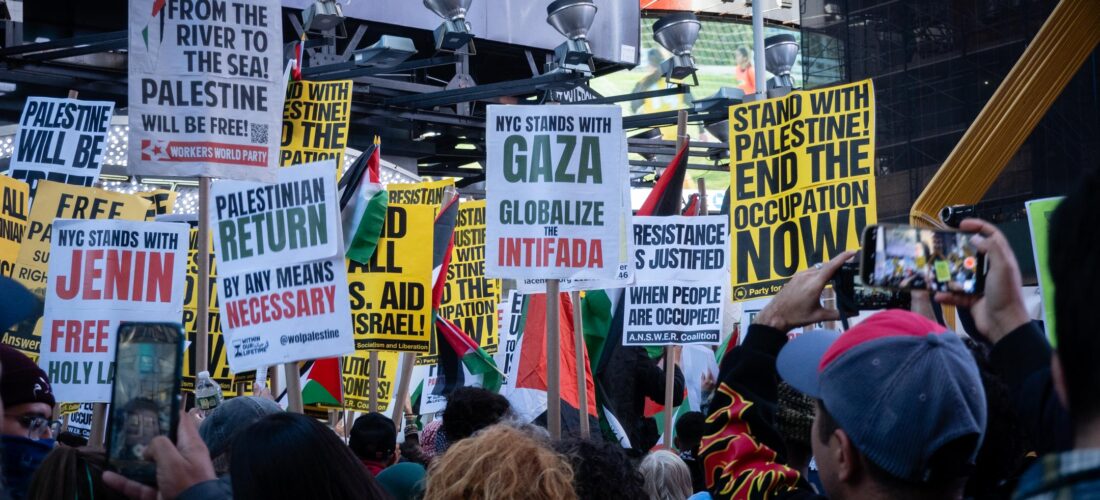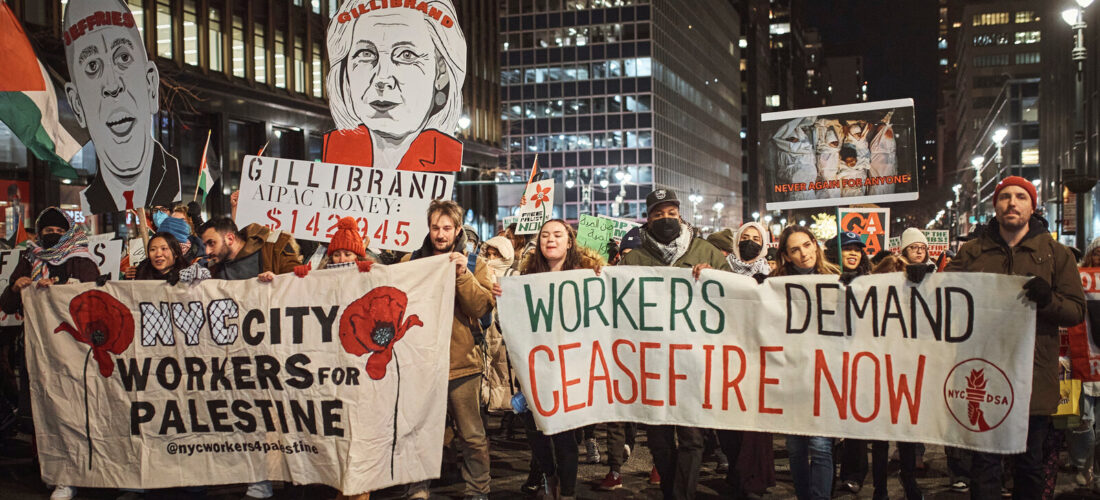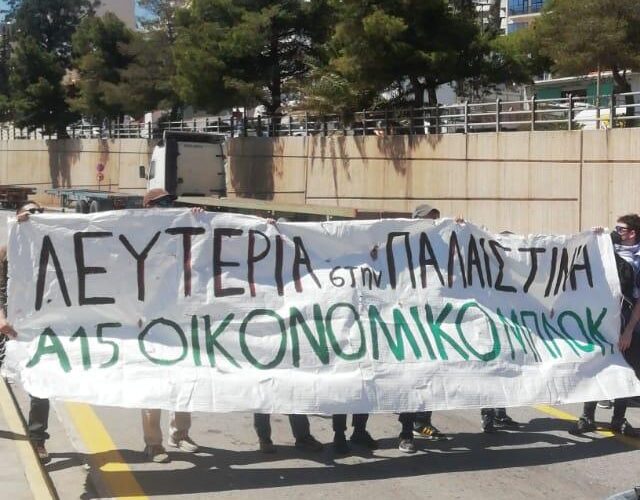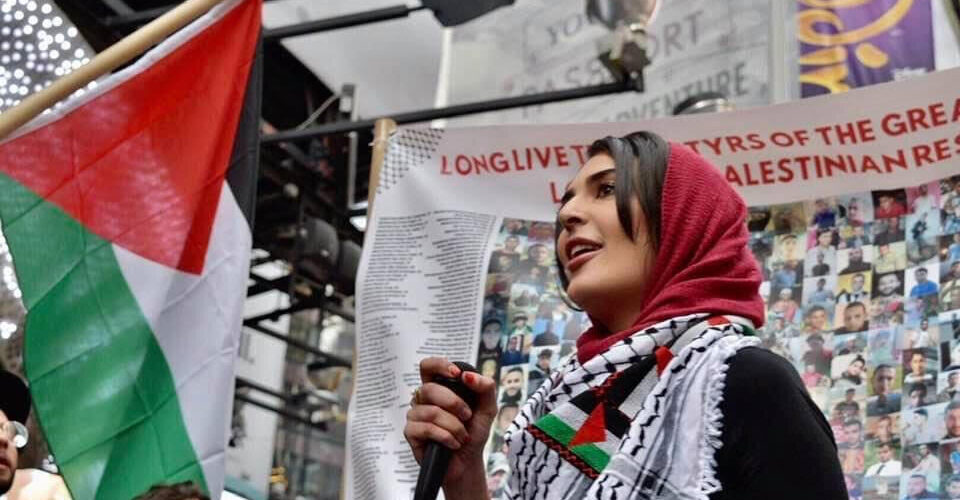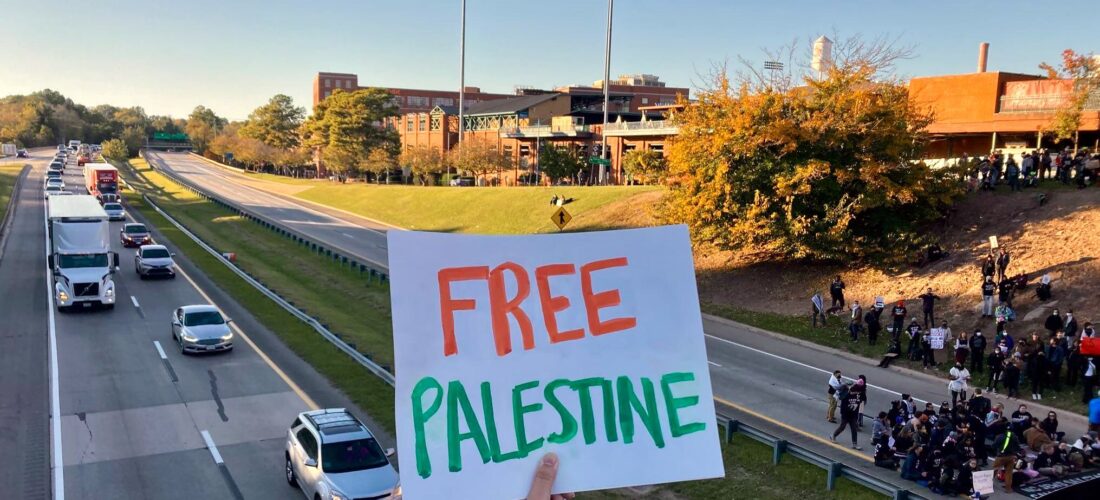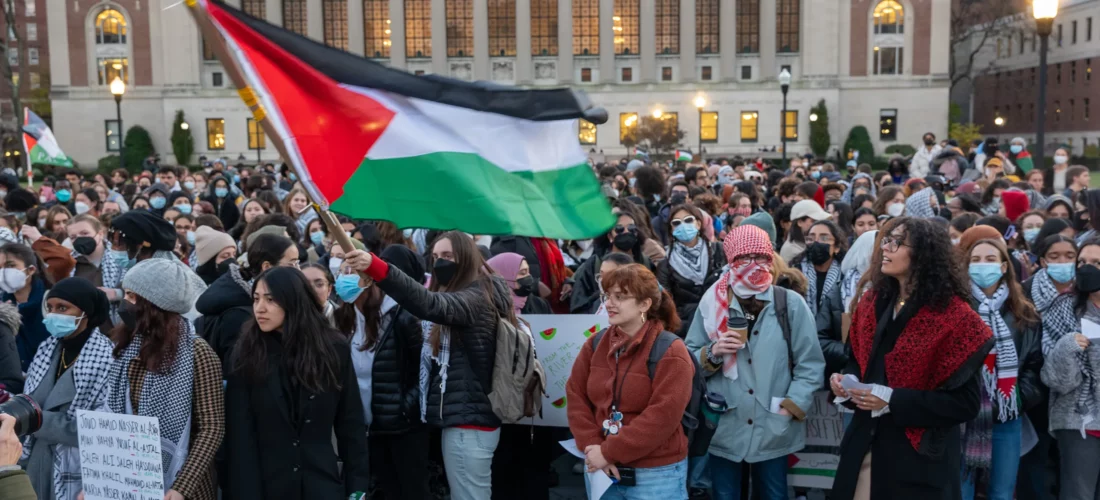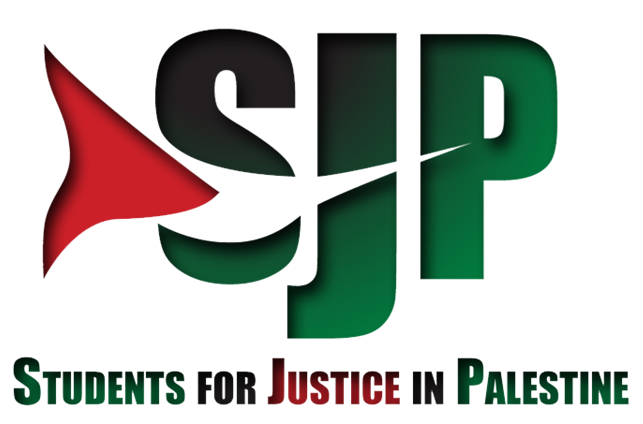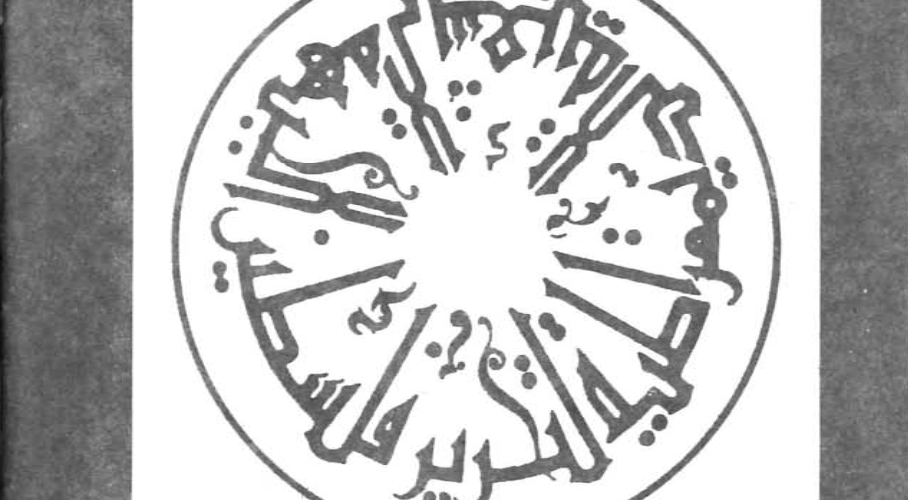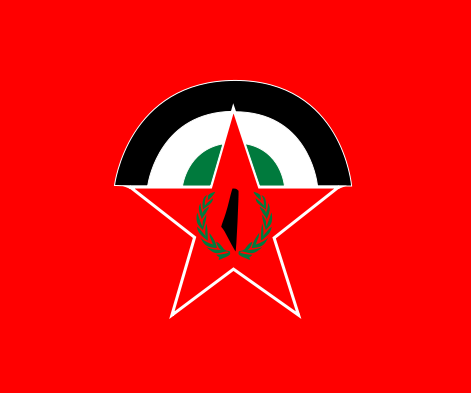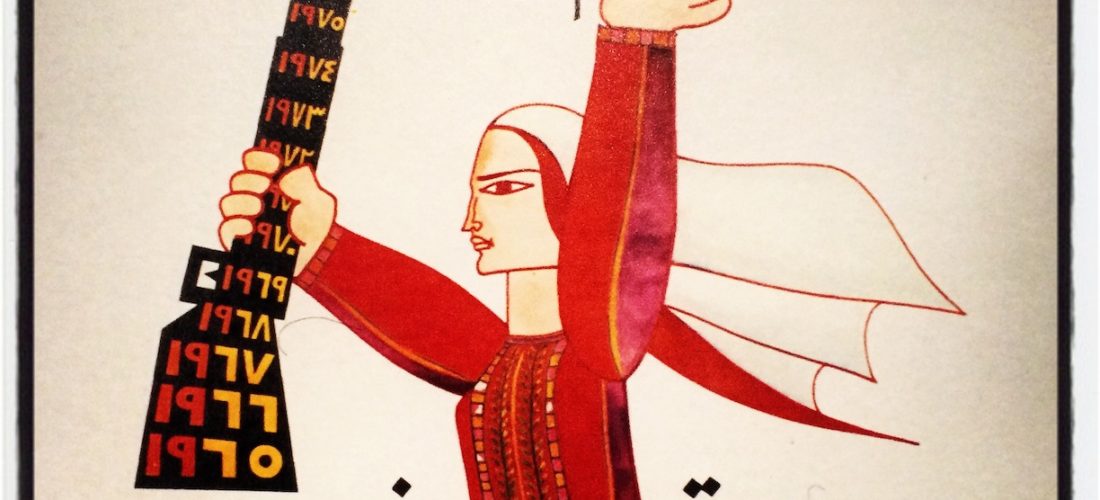This source presents conversations with five college student groups actively organizing for Palestine solidarity at various universities in the United States. The students discuss their strategies and tactics for raising awareness and demanding institutional change, including protests, sit-ins, teach-ins, and divestment campaigns. They focus on disrupting the flow of capital tied to what they perceive as Israeli occupation.
palestine
Statement on Palestine and Student Protests – University of Maryland, Baltimore Macro Student Union of the School of Social Work (2024)
2011-Present, Authority, Date, Defining the Enemy, Disruptive Spaces, Imperialism, Institutions, Students, Subjectives of RefusalThis statement from the SSW Macro Student Union critiques the University of Maryland Baltimore and its School of Social Work for their handling of the genocide in Palestine, arguing that the institutions prioritize profit over student well-being and uphold oppressive power structures. The student union emphasizes that social work ethics necessitate advocating for Palestinian liberation and demands that the university disclose and divest from companies contributing to the genocide, issue a statement acknowledging the genocide and scholasticide, reconsider their commencement speaker choice due to his pro-Israel stance, among other demands. The statement concludes by aligning their efforts with historical student movements advocating for social change and commemorating the 76th anniversary of al-Nakba.
Open Letter – Columbia Students for Justice in Palestine and Columbia Jewish Voice for Peace (2023)
2011-Present, Authority, Date, Defining the Enemy, Disruptive Spaces, Imperialism, Institutions, Students, Subjectives of RefusalThis document is an open letter authored by Columbia Students for Justice in Palestine and Columbia Jewish Voice for Peace condemning Israel’s actions as settler-colonialism and apartheid, while expressing solidarity with Palestinian resistance. The authors criticize Columbia University’s administration for biased communications that favor Israel and disregard Palestinian suffering, and for its continued financial ties to companies profiting from the occupation. They demand the university acknowledge Palestinian humanity, divest from implicated companies, and end academic programs and partnerships that they argue normalize apartheid. The letter concludes with a call for student action and protest to pressure the administration and achieve justice for Palestinians.
Statement on the Ceasefire in Gaza – NYC Labor for Palestine (2025)
2011-Present, Date, Defining the Enemy, Disruptive Spaces, Imperialism, The WorkplaceThis source presents a statement from NYC Labor for Palestine following a ceasefire in Gaza, which they view as a significant victory for Palestinian resistance over the Zionist entity and U.S. Empire. The group expresses solidarity with the Palestinian people after a period of intense violence and emphasizes the ongoing urgency of confronting what they call U.S.-backed Israeli genocide. They reiterate their commitment to the Boycott, Divestment and Sanctions (BDS) movement and outline demands for unions and workplaces, including ending the siege on Gaza, halting U.S. military aid to Israel, and severing ties with Israeli labor organizations. The statement also criticizes the U.S. government, specifically the Biden administration, for its role in the conflict, and calls for workers to engage in resistance against the forces they believe support the occupation of Palestine.
A15 Athens Economic Blockade for Palestine Statement (2024)
2011-Present, Blockade/Barricade, Date, Defining the Enemy, Disruptive Spaces, Imperialism, Infrastructure/Data, Tactics of DisruptionThis is a statement from a group in solidarity with the Palestinian Resistance. They argue that traditional forms of protest are no longer sufficient and therefore support a global economic blockade, citing their action at the port of Perama as part of this effort to disrupt the systems that facilitate the conflict. The statement specifically targets ZIM Shipping, an Israeli company it accuses of being integral to the logistical support of the Israeli military, and also condemns the Greek government for its military and economic agreements with Israel, viewing these as evidence of Greek complicity.
From the Encampments: Student Reflections on Protests for Palestine (2024)
2011-Present, Blockade/Barricade, Date, Defining the Enemy, Disruptive Spaces, Imperialism, Institutions, Occupation, Tactics of DisruptionThis document features reflections from students at Columbia Law, City University of New York (CUNY) Law, New York Law, and Yale Law students, offering firsthand accounts and analyses of the motivations, demands, and experiences within the student encampments protesting their universities’ financial ties to Israel and the ongoing conflict in Gaza. The sources also highlight the historical context of student activism, drawing parallels to past divestment movements, and argue that universities are deeply intertwined with global and local systems of capitalism, gentrification, and imperialism, which the protests aim to disrupt.
The Written Resistance #6 – National Students for Justice in Palestine (2025)
2011-Present, Consciousness Raising, Date, Defining the Enemy, Disruptive Spaces, Imperialism, Institutions, Occupation, Students, Subjectives of Refusal, Tactics of DisruptionThis is the sixth edition of the newsletter written by a compilation of individual authors and published by the National Students for Justice in Palestine. The authors analyze the historical context of the movement, discuss internal challenges like unifying various factions, and examine the broader global forces at play, including US imperialism and the capitalist system. Several pieces explore how different fields, such as medicine, and various locations, like Oklahoma, connect to and are impacted by this struggle. Furthermore, the texts advocate for continued resistance, emphasizing strategies like grassroots organizing, confronting corporate complicity in the oppression of Palestinians, and fostering solidarity across different communities and movements to achieve lasting liberation.
DEFENDING THE CAMP (2024)
2011-Present, Blockade/Barricade, Date, Defining the Enemy, Disruptive Spaces, Imperialism, Institutions, Occupation, Students, Subjectives of Refusal, Tactics of DisruptionThis document, “DEFENDING THE CAMP,” published by CrimethInc., is a report from participants in the Gaza solidarity encampment at the University of Illinois Urbana-Champaign. It recounts the initial days of the protest, detailing the students’ efforts to establish and maintain their encampment in the face of police intervention and university opposition.
Strategizing for Palestinian Solidarity – CrimethInc. (2024)
2011-Present, Blockade/Barricade, Date, Defining the Enemy, Imperialism, Occupation, Tactics of DisruptionThis CrimethInc. zine explores the connections between Palestinian solidarity and other social justice movements, particularly the “Stop Cop City” effort in Atlanta, highlighting shared roots in resisting state violence and repression, including training exchanges between U.S. and Israeli police. The article also highlights examples of direct action resistance, such as the tactics of Palestine Action, a pro-Palestinian protest network that uses direct action to shut down and disrupt multinational arms dealers, targeting Elbit Systems through blockades and sustained campaigns, as well as historical precedents of blockades, demonstrations, and sabotage against war efforts.
The Written Resistance #5 – National Students for Justice in Palestine (2024)
2011-Present, Authority, Blockade/Barricade, Date, Defining the Enemy, Disruptive Spaces, Imperialism, Institutions, Occupation, Sabotage/Ecotage, Students, Subjectives of Refusal, Tactics of DisruptionThis is the fifth edition of the newsletter written by a compilation of individual authors and published by the National Students for Justice in Palestine. The edition offers perspectives and reflections on the tactics and lessons learned from both historical and contemporary struggles against oppression and imperialism. It draws parallels between past movements, such as the Black Panther Party and Students for a Democratic Society, and current activism, including that of the Students for Justice in Palestine organization. The texts also critique the role of universities in perpetuating existing power structures, particularly through their focus on STEM fields and financial interests. Ultimately, the authors call for continued solidarity and resistance against injustice, stressing the importance of learning from past struggles to chart a path toward liberation.
The Written Resistance #4 – National Students for Justice in Palestine (2024)
2011-Present, Authority, Blockade/Barricade, Date, Defining the Enemy, Disruptive Spaces, Imperialism, Institutions, Occupation, Students, Subjectives of Refusal, Tactics of Disruption, UncategorizedThis is the fourth edition of the newsletter written by a compilation of individual authors and published by the National Students for Justice in Palestine. The edition features a range of articles documenting student activism across several universities, including Columbia, the University of North Carolina at Chapel Hill, Waterloo, Birzeit University, the American University of Beirut, and the University of Texas at Dallas. These articles explore student strategies, challenges with university administrations, and their connections to the military-industrial complex. The publication emphasizes the reclamation of political space and the forging of decolonized solidarity in a unified struggle against oppression.
Open Letter from Students for Justice in Palestine to Universities (2024)
2011-Present, Authority, Date, Defining the Enemy, Disruptive Spaces, Imperialism, Institutions, Students, Subjectives of RefusalThis letter was released by Students for Justice in Palestine on April 21, 2024. In the document, SJP lays out its mission, sets forth various demands, expresses solidarity with SJPs across the country, and makes clear its determination to reclaim student power on campus to pursue justice and liberation for the people of Palestine.
The Written Resistance #3 – National Students for Justice In Palestine (2024)
2011-Present, Authority, Blockade/Barricade, Date, Defining the Enemy, Disruptive Spaces, Imperialism, Institutions, Students, Subjectives of Refusal, Tactics of DisruptionThis is the third edition of the newsletter written by a compilation of individual authors and published by the National Students for Justice in Palestine. The importance of discomfort, the global struggle against imperialism, information on the Palestine Solidarity Movement, accounts of personal experiences, various calls to action, and other important topics were included in the newsletter.
The Written Resistance #2 – National Students for Justice In Palestine (2024)
2011-Present, Authority, Blockade/Barricade, Date, Defining the Enemy, Disruptive Spaces, Imperialism, Institutions, Students, Subjectives of Refusal, Tactics of DisruptionThis is the second edition of the newsletter written by a compilation of individual authors and published by the National Students for Justice in Palestine. Smiling as an act of resistance, Palestinian educational institutions, the role of US students and workers in the struggle for Palestine, decolonization as a practice, recommendations for student organizing, and other topics were included in the newsletter.
A Call to Bucknell Faculty, Staff, and Students – Bucknell Students for Justice in Palestine (2024)
2011-Present, Authority, Date, Defining the Enemy, Disruptive Spaces, Imperialism, Institutions, Strike, Students, Subjectives of Refusal, Tactics of Disruption, The BourgeoisieThis is a statement made by the Students for Justice in Palestine at Bucknell University (BUSJP), located in Lewisburg, Pennsylvania. The group set forth four demands for the university including disclosing the identities of all donors and investment portfolios, divesting from companies that fund the Israeli government, denouncing Israel and the repression of university students across the country who support Palestine, as well as detaching from corporate partnerships that support the genocide. Additionally, BUSJP calls on everyone at the university to join the student movement and participate in the strike by withholding their labor.
“If there is no functioning university in Gaza, there should be no functioning university here.”
The Written Resistance #1 – National Students for Justice in Palestine (2024)
2011-Present, Authority, Blockade/Barricade, Date, Defining the Enemy, Disruptive Spaces, Imperialism, Institutions, Occupation, Students, Subjectives of Refusal, Tactics of DisruptionThis is the first edition of the newsletter written by a compilation of individual authors and published by the National Students for Justice in Palestine. The right to resist, a history of the Israeli-Palestinian conflicts, information on the BDS (Boycott, Divestment, and Sanctions) and the Palestinian Feminist Collective movements, accounts of personal experiences, various calls to action, and other topics were included in the newsletter.
Joint Statement by Harvard Palestine Solidarity Groups on the Situation in Palestine (2024)
2011-Present, Authority, Date, Defining the Enemy, Disruptive Spaces, Imperialism, Institutions, Occupation, Students, Subjectives of Refusal, Tactics of DisruptionIn this piece, Palestine Solidarity Groups at Harvard University take a stand against the violence committed against Palestinians and call on the Harvard community to take action. This is a part of a string of pro-Palestinian protests on college campuses across the United States against both the Israel-Hamas War and the financial ties these various universities have with Israel.
Press Release – Columbia Students for Justice in Palestine (2024)
2011-Present, Authority, Date, Defining the Enemy, Disruptive Spaces, Imperialism, Institutions, Occupation, Students, Subjectives of Refusal, Tactics of DisruptionThis is a press release from the Columbia Students for Justice in Palestine’s Twitter page. In the document, the organization demands their voices be heard, likens their quest for liberation to that of the Civil Rights Movement and other anti-war protests, as well as vows to remain in place until their demands are met. These demands include a complete divestment of all finances linked to the Israeli apartheid in Palestine, complete transparency of all of Columbia’s financial investments, and amnesty for everyone at the university who has been penalized for participating in the movement for Palestinian liberation.
Call to Action – National Students for Justice in Palestine (2024)
2011-Present, Authority, Date, Defining the Enemy, Disruptive Spaces, Imperialism, Institutions, Occupation, Students, Subjectives of Refusal, Tactics of DisruptionThis was a call to action posted on the social media accounts of the National Students for Justice in Palestine (SJP) on April 19, 2024. In the document, the National SJP criticizes the decision of the universities to choose profit and reputation over the lives of those in Palestine and the will of the students. The organization expresses solidarity with other chapters of SJP across the nation and calls on them for continued action.
Press Release from The New School Students for Justice in Palestine
2011-Present, Authority, Date, Defining the Enemy, Disruptive Spaces, Imperialism, Institutions, Occupation, Students, Subjectives of Refusal, Tactics of DisruptionOver the past weeks at various universities across the United States, students have erected encampments to demand action to end Israel’s war on the Gaza Strip. These protests have arisen on the campuses of some of the US’ highest academic institutions, including Harvard and Columbia. This document is a press release from The New School Students for Justice in Palestine, a student-organization at The New School in New York City. In the press release, they expressed their solidarity with other student protesters across the country, described why they established the encampment, detailed the rich history of student protest at the school, and set forth a list of demands for the university. Some of these demands included a complete divestment from all corporations that benefit from and are complicit in the ongoing genocide against the Palestinian people, greater protection for pro-Palestinian protesters, a full academic boycott of Israeli academic and cultural institutions, among others.

Statement by Al-Fateh to the United Nations General Assembly (1968)
1946-1989, Authority, Colonized, Date, Defining the Enemy, Disruptive Spaces, Imperialism, Subjectives of Refusal, Subjects Redefined, The HomeIn October 1968, Al-Fateh delivered a statement at the 23rd session of the General Assembly of the UN. In this statement, Al-Fateh compared the Palestinian resistance movement to those against German occupation during WWII, declared the continuance of this struggle against the foreign occupation of Palestine no matter the time taken, rejected the proposed Security Council resolution, called on the United Nations and the peoples of the world to take a stand in respect to the cause of the displaced Palestinian people, in addition to making various other demands.
Dump Veolia Campaign
1990-2010, 2011-Present, Date, Defining the Enemy, Disruptive Spaces, Strike, Tactics of Disruption, The Bourgeoisie, Urban Spaces, We're Not Paying ThatThe BDS, Boycott Divestment and Sanctions organization, is an organization that uses tactics such as boycotting certain companies/brands to curb further investment into Israel. One of their most successful campaigns was Dump Veolia, which was focused on getting the company to stop its contracts that would take place in the occupied settlements of Palestine. One source said that this campaign of disruption against a powerful company cost them over 20 billion dollars. After this campaign, local government and countries started to avoid engaging with this company again. This campaign emphasizes the way that collective action can work, even in the face of opposition from a powerful company. The attached document describes the issues of the contracts in depth and how they approached each action.
Birthright Unplugged
2011-Present, Date, Defining the Enemy, Disruptive Spaces, Indigenous, Self Institution, Subjectives of Refusal, Tactics of Disruption, Urban SpacesBirthright Unplugged is an organization that aimed to give people a perspective on what the Palestinian people endured throughout their occupation. During this program, participants meet with Palestinian activists and other members of the community while visiting different sites. This organization is partially a response to Birthright Israel, that offers young Jewish people a free trip to Israel. Birthright Unplugged’s symbol is a form of cultural jamming by using the same symbol as Israel’s program with the colors of the Palestinian flag. Travel has become a way to disrupt a powerful institution’s injustices by creating awareness and inviting people to learn the full story. Oftentimes, these sponsored trips only offer specific narratives from a Zionist, occupier perspective. Below are just a few pictures from the very first trip. To explore more, this is the link to their website!

“When oppressed, silenced, and marginalized communities tell us their story, they are asking for something in return, asking us to take a stand as they have. To speak out as they have. To take risks, as they have. To truly listen is to know that we must truly act.”
— June Jordan
PLO Information Bulletin (December 1980)
1946-1989, Colonized, Date, Subjectives of RefusalThe PLO regularly published information bulletins almost monthly. This issue is the December 1980 bulletin with a cover which shows a demonstration in solidarity with Palestine in Washington.
Committees for Solidarity with the Palestinian Revolution (1969)
1946-1989, Colonized, Date, Subjectives of Refusal“Committees for Solidarity with the Palestinian Revolution” was a 1969 pamphlet published by the Democratic Popular Front for the Liberation of Palestine. The pamphlet included interviews with leaders, aims for the DFLP, and two militant operations in the works.
The Palestinian Revolution: The Right to Self-Determination and the Independent State (1977)
1946-1989, Colonized, Date, Subjectives of Refusal“The Palestinian Revolution: The Right to Self-Determination and the Independent State” was a 1977 publication by the Democratic Front for the Liberation of Palestine. The publication was a collection of infromation and messages regarding the fight for Palestinians’ right to self-determination in the context of the occupation.
The Struggle of Palestinian Women (1975)
1946-1989, Colonized, Date, Subjectives of Refusal, Women“The Struggle of Palestinian Women” was a 1975 study published by the Palestine Liberation Organization’s (PLO) research center. It explains the emotional and physical struggle and resistnace of Palestinian women under the occupation.
“Political and Armed Struggle” Al Fatah (1974)
1946-1989, Colonized, Date, Subjectives of Refusal“Political and Armed Struggle” was a pamphlet published in 1974 by Al-Fatah. This pahmplet explains the organization, aims, and tactics ofthe party. It illustrates the tie between armed and political struggles against oppression. Al Fatah is the largest faction of the Palestine Liberation Organization (PLO). The Fatah party is a social democratic party following a Palestinian nationalism ideology. The party advocates for a secular, two-state solution.
Palestinian Children: The Generation of Liberation (1970)
1946-1989, Colonized, Date, Subjectives of Refusal“Palestinian Children: The Generation of Liberation” is a sociological study by Bassem Sirhan, published by the Palestine Liberation Organization’s (PLO) research center in 1970. The study focused on the liberation tactics used by Palestinian children against the occupation.
“Two Military Operations in the Heart of the Beast” Democratic Palestine (1984)
1946-1989, Colonized, Consciousness Raising, Date, Subjectives of Refusal, Tactics of Disruption“Democratic Palestine” was a publication started in 1979 with the intention of cultivating solidarity among all global struggles against imperialism in the context of Palestine. This issue, “Two Military Operations in the Heart of the Beast”, was split into six sections; Palestine, Jordan, Lebanon, Arab World, World, and Culture.
The National Liberation Movement Al-Fateh (1960s/70s)
1946-1989, Colonized, Date, Defining the Enemy, Subjectives of RefusalThis document is an outline to familiarize the public with the demands and organization of Fateh, a political party within the Palestine Liberation Organization (PLO) advocating against the occupation of Palestine. This document has a table of contents, which divides the pamphlet by introduction, followed by the history of the occupation, then the evacuation of Palestinians from the land, leading to the emergence of Al-Fateh as a party. It then goes out to distinguish the aims of the party, their positions, and what lies in their future.
Revoultion Until Victory (1970s)
1946-1989, Colonized, Date, Subjectives of Refusal“Revolution Unitl Victory” was most likely published in the 1970s, and is a pamphlet which outlines the demands of Palestinians. It includes their intents and achievements, and defines terms such as Zionism and decolonization in the context and Palestine and Israeli. Fateh, whichmore formerly goes by the Palestinian National LIberation Movement, is the largest faction of the Palestine Liberation Organization (PLO). The Fateh party is a social democratic party following a Palestinian nationalism ideology. The party advocates for a secular, two-state solution.
Popular Front for the Liberation of Palestine Leader Ghassan Kanafani Interview (1970)
1946-1989, Colonized, Date, Disruptive Spaces, Institutions, Subjectives of Refusal, Urban SpacesIn 1970, Ghassan Kanafani, a leader for the Popular Front for the Liberation of Palestine was interviewed in Beirut. At the time, the PFLP was fighting against forces in Jordan to determine whether Jordan would be ruled by the PFLP or the Hashemite Monarchy. In this interview, Kanafani rejects a westernized perception of the events, where the PLFP is engaged in a civil war, and instead incorporates fascism, and the history of exploitation of his people in his understanding of the motives behind the fighting. Defining the PLFP’s efforts not as a conflict but as a liberation movement for justice, Kanafani fundamentally alters the way that the interviewer is forced to think about his questions, and the way the world must consider his answers.
